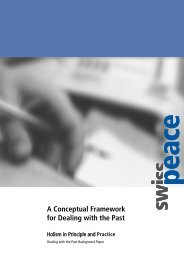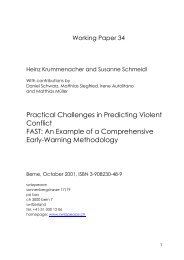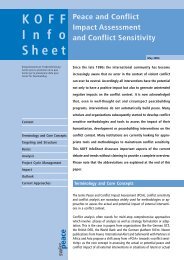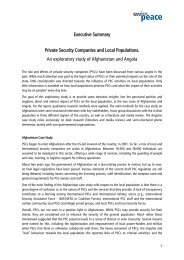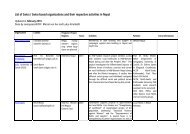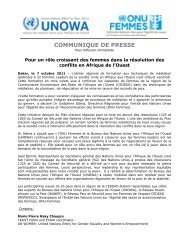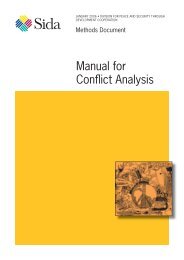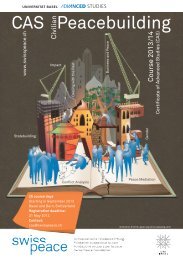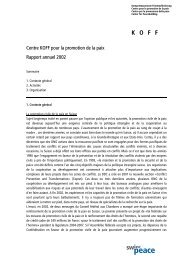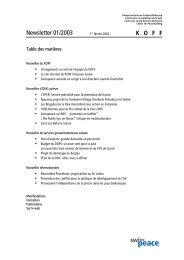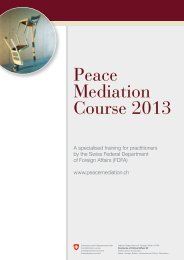Unpacking the Mystery of Mediation in African Peace ... - Swisspeace
Unpacking the Mystery of Mediation in African Peace ... - Swisspeace
Unpacking the Mystery of Mediation in African Peace ... - Swisspeace
You also want an ePaper? Increase the reach of your titles
YUMPU automatically turns print PDFs into web optimized ePapers that Google loves.
Nor<strong>the</strong>rn Uganda, Juba Negotiations<br />
Background <strong>of</strong> <strong>the</strong> Conflict<br />
Root Causes<br />
The conflict <strong>in</strong> Nor<strong>the</strong>rn Uganda arose <strong>in</strong> <strong>the</strong><br />
context <strong>of</strong> competition for political and economic<br />
resources between different regional and ethnic<br />
groups <strong>in</strong> Uganda, <strong>the</strong> roots <strong>of</strong> which were sown<br />
dur<strong>in</strong>g <strong>the</strong> British colonial era. While <strong>the</strong> South<br />
was favored economically, Nor<strong>the</strong>rn Ugandans,<br />
<strong>in</strong> particular <strong>the</strong> Acholi, made up most <strong>of</strong> <strong>the</strong> recruits<br />
for <strong>the</strong> army. After Uganda ga<strong>in</strong>ed <strong>in</strong>dependence<br />
<strong>in</strong> 1962, <strong>the</strong> Acholi military establishment<br />
supported <strong>the</strong> demagogic rules <strong>of</strong> Milton<br />
Obote and later <strong>of</strong> Tito Okello. When Yoweri<br />
Museveni’s National Resistance Movement<br />
usurped power <strong>in</strong> 1986, “<strong>the</strong> Acholi were ousted<br />
from power <strong>in</strong> all doma<strong>in</strong>s, and many a group <strong>in</strong><br />
Uganda was <strong>in</strong> <strong>the</strong> mood for settl<strong>in</strong>g scores.” 162 In<br />
subsequent years, as Museveni consolidated his<br />
reign and modernized <strong>the</strong> country, <strong>the</strong> Acholi<br />
were kept on <strong>the</strong> marg<strong>in</strong>s <strong>of</strong> society and largely<br />
denied access to political and economic resources.<br />
Chronology<br />
Aga<strong>in</strong>st <strong>the</strong> background <strong>of</strong> Acholi marg<strong>in</strong>alization,<br />
<strong>in</strong>surgent groups emerged <strong>in</strong> Nor<strong>the</strong>rn<br />
Uganda <strong>in</strong> <strong>the</strong> late 1980s <strong>in</strong>clud<strong>in</strong>g a group led<br />
by Joseph Kony that was later to become <strong>the</strong><br />
LRA. In <strong>the</strong> 1990s, <strong>the</strong> conflict <strong>in</strong> Nor<strong>the</strong>rn<br />
Uganda was exacerbated as <strong>the</strong> LRA became an<br />
actor <strong>in</strong> <strong>the</strong> broader regional conflict between<br />
Uganda and Sudan. In retaliation for Museveni’s<br />
support <strong>of</strong> <strong>the</strong> SPLM, <strong>the</strong> Sudanese government<br />
<strong>in</strong> Khartoum began f<strong>in</strong>anc<strong>in</strong>g and arm<strong>in</strong>g <strong>the</strong><br />
LRA as a proxy force. At <strong>the</strong> same time, <strong>the</strong> LRA<br />
dissociated itself from <strong>the</strong> Acholi and <strong>in</strong>creas<strong>in</strong>gly<br />
perpetuated violence aga<strong>in</strong>st <strong>the</strong> very community<br />
it claimed to defend. 163 The LRA committed unspeakable<br />
atrocities, most <strong>in</strong>famously <strong>the</strong> abduction<br />
and forced recruitment <strong>of</strong> children as soldiers.<br />
Local communities also suffered from human<br />
rights abuses that <strong>the</strong> Ugandan army, <strong>the</strong><br />
Uganda People’s Defence Forces (UPDF), committed<br />
<strong>in</strong> various counter-<strong>in</strong>surgency operations.<br />
162 Doom, Ruddy and Vlassenroot, Koen: “Kony’s Message: A<br />
New Ko<strong>in</strong>e? The LRA <strong>in</strong> Nor<strong>the</strong>rn Uganda”, <strong>in</strong>: <strong>African</strong> Affairs,<br />
no. 390 (1999), p. 10.<br />
163 V<strong>in</strong>ci, Anthony: “Existential Motivations <strong>in</strong> <strong>the</strong> Lord’s Resistance<br />
Army’s Cont<strong>in</strong>u<strong>in</strong>g Conflict”, <strong>in</strong>: Studies <strong>in</strong> Conflict &<br />
Terrorism, vol. 30, no. 4 (2007).<br />
Thus, <strong>the</strong> 30-year war <strong>in</strong> Nor<strong>the</strong>rn Uganda has<br />
caused tens <strong>of</strong> thousands <strong>of</strong> deaths and displaced<br />
<strong>of</strong> hundreds <strong>of</strong> thousands <strong>of</strong> refugees. Despite<br />
significant <strong>in</strong>ternational pressure and multiple<br />
UPDF campaigns, <strong>the</strong> LRA has proved resistant<br />
to military defeat.<br />
Previous Negotiations, Entry<br />
Po<strong>in</strong>ts and Pre-Negotiations<br />
Before <strong>the</strong> Juba talks, <strong>the</strong>re were several attempts<br />
at mak<strong>in</strong>g peace between <strong>the</strong> LRA and <strong>the</strong> GoU,<br />
<strong>the</strong> most notable <strong>of</strong> which was led by Betty<br />
Bigombe <strong>in</strong> <strong>the</strong> 1990s. 164 However, none <strong>of</strong> <strong>the</strong>se<br />
<strong>in</strong>itiatives succeeded, most importantly because<br />
<strong>the</strong> parties rema<strong>in</strong>ed conv<strong>in</strong>ced that <strong>the</strong>y could<br />
achieve <strong>the</strong>ir aims better on <strong>the</strong> battle field than<br />
at <strong>the</strong> negotiation table. The situation changed <strong>in</strong><br />
2006, mak<strong>in</strong>g <strong>the</strong> Juba talks <strong>the</strong> most promis<strong>in</strong>g<br />
attempt at end<strong>in</strong>g <strong>the</strong> conflict <strong>in</strong> Nor<strong>the</strong>rn<br />
Uganda so far. The reasons for this are that (a)<br />
<strong>the</strong> context has evolved and that (b) a powerful<br />
and highly committed mediator materialized <strong>in</strong><br />
<strong>the</strong> form <strong>of</strong> Riek Machar.<br />
Chang<strong>in</strong>g context<br />
Three developments changed <strong>the</strong> context <strong>of</strong> <strong>the</strong><br />
conflict <strong>in</strong> Nor<strong>the</strong>rn Uganda after <strong>the</strong> turn <strong>of</strong> <strong>the</strong><br />
millennium and made its peaceful resolution possible:<br />
first, and most importantly, Khartoum discont<strong>in</strong>ued<br />
its support for <strong>the</strong> LRA after <strong>the</strong> conclusion<br />
<strong>of</strong> <strong>the</strong> CPA <strong>in</strong> January 2005. Second, <strong>in</strong><br />
2005, <strong>the</strong> ICC <strong>in</strong>dicted five LRA leaders, <strong>in</strong>clud<strong>in</strong>g<br />
Joseph Kony, without, however, be<strong>in</strong>g able to<br />
apprehend <strong>the</strong>m. Third, Museveni sought to improve<br />
his image, which was affected by allegations<br />
<strong>of</strong> corruption and electoral malpractice as well as<br />
his <strong>in</strong>ability to address <strong>the</strong> humanitarian crisis <strong>in</strong><br />
<strong>the</strong> north. 165 These developments changed <strong>the</strong> <strong>in</strong>centive<br />
structures <strong>of</strong> <strong>the</strong> parties <strong>in</strong> such a way that<br />
<strong>the</strong>y deemed a negotiated solution to <strong>the</strong> conflict<br />
<strong>in</strong> Nor<strong>the</strong>rn Uganda more desirable than before<br />
and were thus ready to seriously engage <strong>in</strong> peace<br />
talks <strong>in</strong> Juba.<br />
164 See Boustany, Nora: “The Woman Beh<strong>in</strong>d Uganda’s <strong>Peace</strong><br />
Hopes”, <strong>in</strong>: The Wash<strong>in</strong>gton Post (11 July 2007), p. A09.<br />
165 International Crisis Group (ICG), “<strong>Peace</strong> <strong>in</strong> Nor<strong>the</strong>rn<br />
Uganda?”, Africa Brief<strong>in</strong>g no. 41 (13 September 2006), p. 11,<br />
(http://www.crisisgroup.org/home/<strong>in</strong>dex.cfm?id=4374).<br />
61




